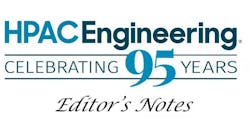Energy efficiency, like “The Force” in the Star Wars saga, seems to surround and bind together everything in the HVAC engineering universe. Even if a building owner insisted that he or she wanted the best possible comfort, you can rest assured that the HVAC design engineer would not be given a blank check and told to create that comfort “at any cost.” Energy efficiency would still be important.
But there’s more to energy efficiency than savings on building owners’ utility bills. It’s likely that everyone is aware of the incredible environmental challenges certain areas of China are facing, thanks to that country’s reliance on power plants that burn high-sulfur coal.
Granted, the United States is not China. We don't brun the high-sulfur coal here. And even though Texas Governor Rick Perry famously said he wanted to “get rid of the EPA,” it’s unlikely that the United States will ever face the type of environmental degradation we’re now seeing in China. Still, energy-efficiency measures that help take power plants offline, or prevent construction of new ones, are worthy endeavors, and are a nice side-effect to our industry’s desire to provide clients with energy-efficient buildings.
So take advantage of all the knowledge and technology that we have today to make buildings as energy-efficient as possible. The ongoing worldwide focus on energy-efficiency brings many opportunities to our industry, and even the most ardent regulation-haters need look no further than the scenes from China to see how far its importance can extend.








